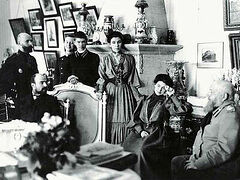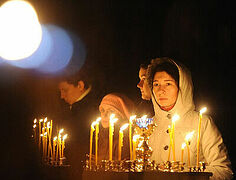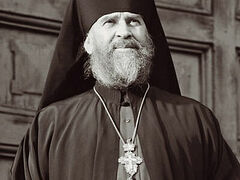 The Holy Trinity-St. Sergius Lavra. Photo: pastvu.com
The Holy Trinity-St. Sergius Lavra. Photo: pastvu.com
In 1948, the theological school changed its location, moving from Moscow to the Holy Trinity-St. Sergius Lavra, and resumed its activities under the protection of St. Sergius. In 1950, Ivan Pavlov graduated from the theological seminary. Next, he entered the Moscow Theological Academy and graduated it in 1954 by presenting his graduate thesis entitled as, “The doctrine of the Sacraments in the works of the Church Fr.s of the first and second centuries of Christianity.”
Batiushka visited his home in Makovo on school breaks during his study years. Archpriest John Kuzmenko continued to serve there, and he mentored the seminarian Ivan Pavlov, strengthening him even more in his desire to serve God as a priest. Thus, Fr. John blessed Ivan, who had come on vacation, to prepare and read sermons. All of his first sermons were delivered in his native church in honor of the Nativity of the Most Holy Mother of God. Already as an ordained priest, Fr. Kirill subsequently made annual trips to his homeland in the days following Radonitsa to serve panikhidas at the graves of his parents and relatives. Then, he would step inside the church, where he always served a litya beside the altar at the place of Fr. John’s repose.
On the day of his last exam, the academy graduate Ivan Pavlov submitted a petition to Archimandrite Pimen (Izvekov), the abbot of the Lavra:1
“Having a long-standing attraction to enter monasticism, I presently have a heartfelt desire, upon my graduation from the Theological Academy, to enter the monastery of St. Sergius and to carry out every obedience that will be entrusted to me there. Therefore I ask you, Fr. Abbot, to accept me into the ranks of novices among the brethren of the Trinity-St. Sergius Lavra.”
Soon there followed a petition from the abbot to the Patriarch to tonsure the novice into monasticism. On August 25, 1954, Archimandrite Pimen (Izvekov) tonsured Ivan Pavlov into monasticism with the name Kirill, in honor of the St. Cyril of White Lake (commemorated on June 9/22). Thus, providentially, Fr. Kirill’s monastic name day fell on the day of the beginning of the Great Patriotic War. In the fall of the same year, on the feast of St. Sergius of Radonezh, Metropolitan Benjamin (Fedchenkov) of Rostov and Kamensk ordained him a Hierodeacon in the Dormition Cathedral of the Lavra, while on November 30, the feast of St. Nikon of Radonezh, Bishop John (Razumov) of Pskov and Porkhov ordained Fr. Kirill a Hieromonk in the Refectory Church there.
In 1954–1955, Fr. Kirill served as a sacristan in the Trinity Cathedral, as the Lavra’s cash steward, assistant treasurer, and later a treasurer of the Lavra. Bishop Afanasy (Sakharov) wrote in 1962 to Archimandrite Theodorit (Vorobyov), the dean of the Lavra:
“I was told that father Kirill is getting really weak... Take care of him and impose on him a strict obedience to take care of himself, eat better, and reduce his monastic feats. And I ask you personally, if ever possible, to raise the question of freeing him from any kind of duties, especially regarding the economic and administrative supervision.”
Under Khrushchev, the Church once again suffered persecution, and Fr. Kirill faced public attacks. A contemporary researcher notes, “In the 1960s, only a few bishops were able to avoid paid newspaper harassment.” This affected Fr. Kirill to a great extent. The Zagorsk newspaper, “Vperyod!” during the so-called Khrushchev “frosts,” published a number of slanderous articles that publicly accused Fr. Kirill of immoral behavior. During Great Lent of 1964, at a Passion service, Fr. Kirill delivered a sermon on “The need to pray in the midst of temptations.”
Fr. Kirill bore the obedience of the Lavra’s father confessor for more than forty years
In the 1960s, in addition to the obedience of a monastery treasurer, Fr. Kirill also had the obedience of assistant to Fr. Peter (Semenovykh), the father confessor of the brotherhood. Following his death in 1971, Fr. Kirill was appointed father confessor to the brethren of the Lavra. He also administered the last rites and gave Holy Communion to His Holiness Patriarch Alexiy I before his death. Fr. Kirill bore his obedience as the Lavra’s confessor for more than forty years. Many consider him as the most outstanding confessor among the brethren of St. Sergius’s monastery of our time.
He was truly attentive to everyone who came to him, he delved into their needs and problems, and sincerely sought to help others. His Beatitude Metropolitan Onufry of Kiev and All Ukraine recalled:
“Batiushka loved and took pity of people. He always told us about it and before his illness he said repeatedly: “Take pity on people, and God will take pity on you.”
 At the relics of the Venerable Sergius of Radonezh Fr. Kirill knew how to preserve peace in his soul and generously shared this peace with others. Covering people’s weaknesses with love, he was able to comfort those who grieved and reconcile those who quarreled. According to Metropolitan Vincent (Morar) of Tashkent and Uzbekistan, you could find consolation when batiushka simply talked to you, or just by being near him—it was consolation, which rooted out your anger and irritability. The soul grew quiet, no one wanted to quarrel, argue, or air grievances and grumble anymore, and everything was just fine. Archpriest Paul Velikanov also recalled concerning this amazing gift that Fr. Kirill possessed:
At the relics of the Venerable Sergius of Radonezh Fr. Kirill knew how to preserve peace in his soul and generously shared this peace with others. Covering people’s weaknesses with love, he was able to comfort those who grieved and reconcile those who quarreled. According to Metropolitan Vincent (Morar) of Tashkent and Uzbekistan, you could find consolation when batiushka simply talked to you, or just by being near him—it was consolation, which rooted out your anger and irritability. The soul grew quiet, no one wanted to quarrel, argue, or air grievances and grumble anymore, and everything was just fine. Archpriest Paul Velikanov also recalled concerning this amazing gift that Fr. Kirill possessed:
“Simply going to see batiushka, just seeing him somewhere, glancing at him—it was impossible to leave unconsoled after that. It was really a kind of a tuning fork—equally inspiring and condemning at the same time. He immediately pointed out what was wrong, what went awry with you, and he also showed right away what to do with it and where the truth was. Fr. Kirill himself was a constant guardian, a bearer of this truth, the truth of God.”
If you compare the soul to a stringed instrument, it is possible to say that the Lord revealed to Fr. Cyril which particular string in the soul of man had to be tightened or loosened so that it could obtain harmony and peace. The soul of man was opening up to his sacrificial love. Batiushka possessed profound insight and pastoral sensitivity. He never applied pressure on the interlocutor, tactfully perceiving and feeling the pain of others. If he had to admonish someone, he did it respectfully, trying not to offend anyone.
He remembered by name all those who at least once sought his advice
In 1986, Fr. Kirill was relieved of his duties as treasurer, and he was able to pay more attention to the spiritual care of the brethren and other believers. When Fr. Kirill confessed the clergy in the altar, he was able to list the names of the heavenly patrons of all those who came to confession at the end of the general confession. It was noted, “Fr. Kirill had a good memory, as he remembered by name everyone who at least once turned to him for advice.”
The theological schools in the Holy Trinity-St. Sergius Lavra are called the Great Cell of St. Sergius. It is common in the life of the theological schools to have general confession and Communion on the first week of Great Lent and during Holy Week. Fr. Kirill always came to hear confessions in the academy’s church. Besides that, he participated in all meetings with students.
“The seminarians of the Moscow Theological Schools were the ones who received a great deal of wise words of counsel and consolation from Fr. Kirill. The decision to follow monasticism or to get married—many trusted batiushka to make this important choice.”
Batiushka regarded his fellow elders Archimandrites Seraphim (Tyapochkin) and Gennady (Davydov) with reverence and remained in spiritual communion with them. When the authorities closed the Glinsk Hermitage monastery, the elders of the monastery gave their blessing to seek counsel and have a confession with Fr. Kirill, the Lavra’s father confessor. When Fr. Seraphim (Romantsov) visited Moscow, he always tried to meet with Fr. Kirill. Metropolitan Zinovy (Mazhuga) of Tetritskaro, when he visited the capital city and the Lavra, also always considered it his duty to see Fr. Kirill. The latter in turn visited Fr. Zinovy when he visited the Caucasus. Fr. Kirill cherished Bishop Afanasy (Sakharov) of Kovrov and held him in great esteem, as he had much in common with him. He wrote:
“I used to meet Bishop Afanasy in the Holy Trinity-St. Sergius Lavra, and also in Petushki… I even stayed with him for about ten days there—Vladyka Afanasy took me under his wing and allowed me to rest due to the weak state of my health.”
Continuous reading of the Holy Scriptures was essential to Archimandrite Kirill. In the 1980s and 1990s, the Bible readings were held in his cell: around 9 pm, there was the reading from the Bible for about thirty minutes, followed by the reading from the holy fathers, such as The Ladder of Divine Ascent by St. John of the Ladder (Climacus), Venerable Abba Dorotheus, the third and fourth volumes of the Philokalia, The Spiritual Meadow, and many other books. Batiushka almost never commented on what he was reading. If someone asked a question about the Holy Scriptures, he suggested seeking the answers from those who received a higher theological education. But sometimes Fr. Kirill would stop reading and ask his listeners, “Do you understand what we are talking about here?” Apparently, he felt that some parts of the reading were difficult to understand for neophyte believers. At the end of the reading, batiushka always said, “Glory Thee, O God…,” and at the conclusion of the meeting he recited the prayer, “It is truly meet…” in front of the icon. Then the doors behind his back would open, his cell attendant would appear and bring out some tasty treats—sandwiches with salted salmon or something like that.
Fr. Kirill said of reading of the Gospel that it brings us closer to the Lord and the Lord sends His grace to those who read and fulfill what they are reading. Batiushka knew by heart whole chapters from the Gospel ,and he used to say that if he had time, he would have “kept reading and reading” the Gospel. The elder read the Gospel during the Divine Liturgy.
“Before the Eucharistic Canon, he used to take the Holy Gospel out of his pocket,” recalled His Beatitude Metropolitan Onufry, “and, while the choir was singing “The Creed,” he kept reading from it. I am not sure, but I think at that moment batiushka was reading the Gospel of John, the passage that describes the Last Supper, that is, the establishment by the Savior of the Sacrament of the Holy Eucharist.”
Fr. Kirill didn’t perform obvious miracles. He distinguished himself by being discreet
Fr. Kirill didn’t perform obvious miracles like St. Seraphim of Sarov or Righteous John of Kronstadt. He distinguished himself by being discreet. Fr. Kirill simply labored like any other monk had to labor, any other monk who was responsible for fulfilling his duties: the divine service, the monastic rule, monastic obedience, receiving, in addition to the brethren, dozens, even hundreds, of lay people every day. His Beatitude Metropolitan Onufry recalled that the elder was surrounded by people all day long, bringing him their perennial problems, but he listened to them patiently and humbly. His day began at half past five, and at half past six he was already at the monastic prayer service and then the Matins:
“He’d wake up for the Matins service, and after Matins, he’d go straight to his “parcel room” (a small annex adjacent to the old brothers’ gatehouse) to receive people until lunch. After lunch, he’d receive people again until the evening service. He’d go to the evening service, and after the service, he would again receive people until late at night.”
The lights in his cell went out as late as about one in the morning.
“Batiushka did not spare himself at all, he had a very overly busy day, and many of the people with whom I had to communicate said, “It is difficult to understand where he gets his strength from!” recounted Metropolitan Vincent.
Fr. Kirill wholeheartedly loved St. Sergius. He had a special spiritual connection with him. Already being paralyzed and remaining in Peredelkino,2 he told the sisters who carried out obedience there about an amazing incident. Once, on the feast of St. Sergius, he served in the Holy Trinity Cathedral of the Lavra with His Holiness the Patriarch. After the Polyeleos service, he followed other clergy to venerate the holy head of Fr. Sergius, as they always did. He kissed the saint’s head, but he couldn’t get up right away, and this was when he heard the words, “I won’t let you go…” Because Fr. Kirill could not raise his head for some time, he felt uneasy and embarrassed in front of the clergy, but he could not straighten up until the saint let him go.
 In the company of Patriarch Alexiy
In the company of Patriarch Alexiy
Because of the elder’s increasing illnesses, often too severe, His Holiness Patriarch Pimen began to invite him to stay at the Patriarchal metochion in Peredelkino to give him some rest and recover on the eve of Lent. Over time, it would happen even more frequently, throughout the year. He was assigned a separate room while there. His Holiness Patriarch Alexiy II continued this tradition. In the last years of his life, beginning in 2003, batiushka, already seriously ill and then bedridden, remained in Peredelkino. For more than thirteen years, Fr. Kirill courageously bore the serious illness that befell him. The people caring for him never heard any complaints or special requests from him. When Fr. Kirill was already gravely ill and bedridden, the nuns who cared for him tried in every possible way to alleviate his suffering; they asked what else they could do to help him. Once, the elder replied, “I have no right to ask.” Apparently, he thought that he had no right to ask for any additional comforts and attention to himself; he was afraid of unnecessarily burdening others with caring for him, of causing them trouble or bothering them.
 Fr. Kirill passed away on February 20, 2017 at about half past ten in the evening in Peredelkino. The news of the passing of the dear batiushka spread overnight throughout the country. Archpastors, abbots and abbesses, and clergymen arrived; panikhidas were ceaselessly served. Everyone strove to honor the memory of his spiritual father—some by praying intensely, others by conducting services or giving a eulogy. Everyone wanted to linger longer near batiushka. The coffin holding the elder in blessed repose was transported to the Lavra late in the evening of the next day. In the Lavra, crowds of people greeted him, with ringing of bells. The coffin was placed in the Dormition Cathedral. Despite the bad weather and the late evening hour, thousands of people followed him to the Dormition Cathedral to participate in the pannikhida service. Fr. Kirill’s repose became the triumph of nationwide deep and grateful love for him. His Holiness Patriarch Kirill presided at the funeral service, accompanied by His Beatitude Metropolitan Onufry of Kiev and All Ukraine, Archbishop Theognost of Sergiev Posad,3 and about forty other hierarchs, as well as numerous clergy. All those who wanted to pray at the elder’s coffin could not fit in the Dormition Cathedral of the Lavra. After the funeral, the people were continued give batiushka their last kiss for over three hours. Then, the coffin was carried in a procession around the Dormition Cathedral and lowered into the grave next to the altar of the Holy Spirit Church.
Fr. Kirill passed away on February 20, 2017 at about half past ten in the evening in Peredelkino. The news of the passing of the dear batiushka spread overnight throughout the country. Archpastors, abbots and abbesses, and clergymen arrived; panikhidas were ceaselessly served. Everyone strove to honor the memory of his spiritual father—some by praying intensely, others by conducting services or giving a eulogy. Everyone wanted to linger longer near batiushka. The coffin holding the elder in blessed repose was transported to the Lavra late in the evening of the next day. In the Lavra, crowds of people greeted him, with ringing of bells. The coffin was placed in the Dormition Cathedral. Despite the bad weather and the late evening hour, thousands of people followed him to the Dormition Cathedral to participate in the pannikhida service. Fr. Kirill’s repose became the triumph of nationwide deep and grateful love for him. His Holiness Patriarch Kirill presided at the funeral service, accompanied by His Beatitude Metropolitan Onufry of Kiev and All Ukraine, Archbishop Theognost of Sergiev Posad,3 and about forty other hierarchs, as well as numerous clergy. All those who wanted to pray at the elder’s coffin could not fit in the Dormition Cathedral of the Lavra. After the funeral, the people were continued give batiushka their last kiss for over three hours. Then, the coffin was carried in a procession around the Dormition Cathedral and lowered into the grave next to the altar of the Holy Spirit Church.




